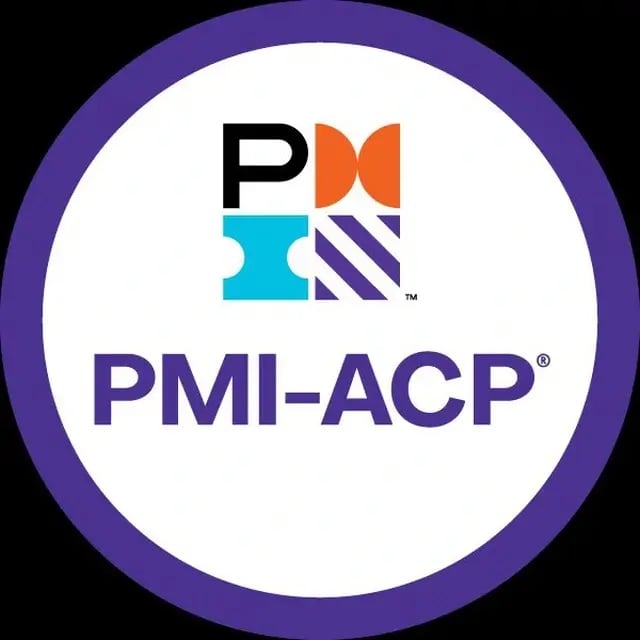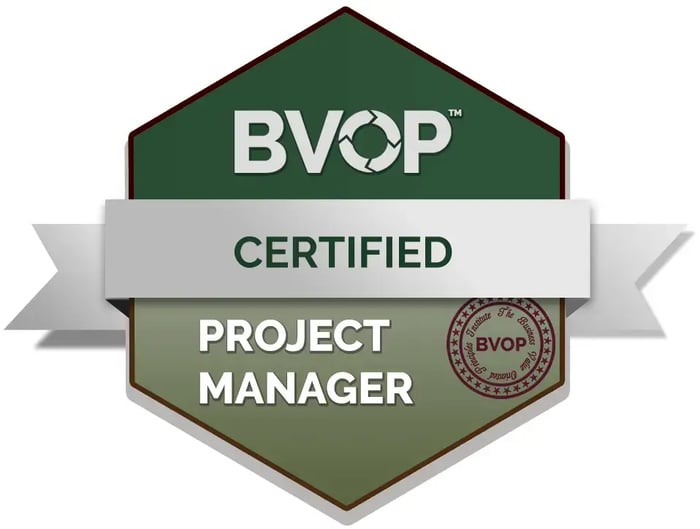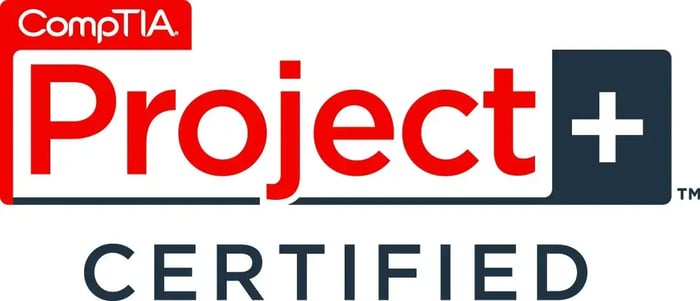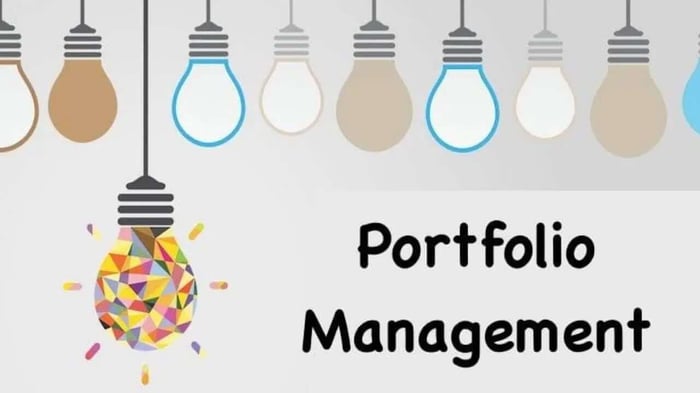Table of Contents
- A Funny Start to Your Agile Journey
- Understanding the PMI-ACP Certification
- PMI-ACP Certification: Eligibility and Requirements
- Exam Structure and Topics Covered
- Preparing for the PMI-ACP Exam
- Career Benefits and Job Opportunities with PMI-ACP
- 10 Lesser-Known Facts About PMI-ACP Certification
- Final Thoughts
- FAQs
A Funny Start to Your Agile Journey
So, you want to become an Agile master? Do you dream of leading projects effortlessly, making everything run smoothly while sipping on your favorite coffee? Well, the PMI-ACP Certification Guide is your key to unlocking Agile excellence! But before you jump in, let’s explore why this certification is essential in 2025 and how it can elevate your career to the next level.
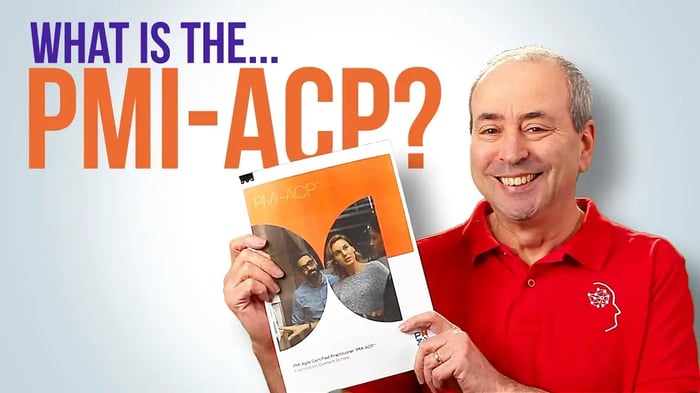
Understanding the PMI-ACP Certification
The PMI-ACP certification is designed for professionals who work in Agile environments and want to validate their expertise across multiple frameworks. As Agile becomes the preferred methodology in various industries, having a well-rounded certification that covers Scrum, Kanban, Lean, and XP can give professionals a competitive edge. The certification demonstrates not only knowledge but also hands-on experience with Agile principles, making it highly valued by employers. Additionally, it bridges the gap between traditional project management and Agile practices, allowing professionals to transition smoothly. Earning this certification can significantly boost a professional’s ability to manage Agile teams effectively and drive project success.
What is PMI-ACP?
The PMI Agile Certified Practitioner (PMI-ACP) certification, offered by the Project Management Institute (PMI), validates a professional’s expertise in Agile methodologies, frameworks, and tools. Unlike other Agile certifications, PMI-ACP covers Scrum, Kanban, Lean, Extreme Programming (XP), and more, making it one of the most comprehensive Agile credentials available.
Why PMI-ACP Over Other Agile Certifications?
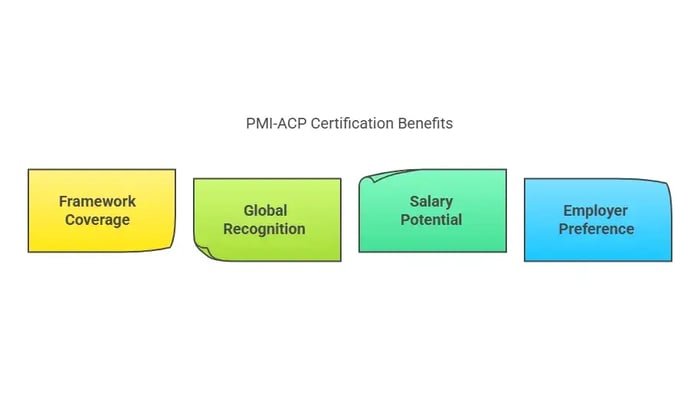
Broader Agile Framework Coverage: Unlike Certified ScrumMaster (CSM), PMI-ACP goes beyond Scrum and incorporates multiple Agile methodologies.
Globally Recognized: PMI is a highly respected organization in project management worldwide.
Higher Salary Potential: PMI-ACP holders earn 25% more than non-certified professionals (PMI Salary Report).
Preferred by Employers: Organizations increasingly seek PMI-ACP-certified professionals for Agile roles.
How PMI-ACP Fits in the Agile World?
Agile project management has taken over industries from IT to healthcare, finance, and even construction. With over 71% of organizations adopting Agile (Forbes), PMI-ACP certification ensures you stay relevant in this ever-evolving landscape.
PMI-ACP Certification: Eligibility and Requirements
Obtaining the PMI-ACP certification requires meeting specific prerequisites that demonstrate both Agile knowledge and hands-on experience. This ensures that certified professionals have a deep understanding of Agile practices and can implement them effectively in real-world scenarios. Candidates must have experience working on Agile teams or managing Agile projects, which guarantees practical exposure to Agile methodologies.
Additionally, formal training is a key requirement, ensuring that applicants are well-versed in Agile concepts before taking the exam. The eligibility criteria are structured to maintain the credibility and rigor of the certification, making it a valuable asset for professionals looking to advance in Agile roles.
Who Can Apply for PMI-ACP?
To qualify for the PMI-ACP exam, candidates must meet the following criteria:
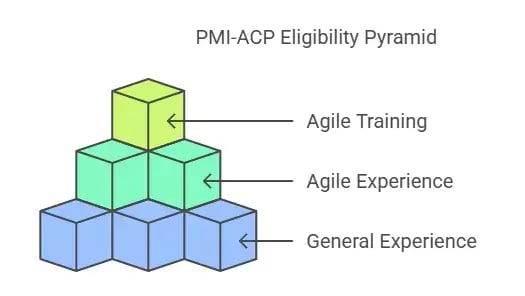
1. General Project Experience
2,000 hours of general project experience (or hold a PMP certification).
2. Agile Project Experience
1,500 hours of Agile project experience working in Agile teams or using Agile methodologies.
3. Agile-Specific Training
21 contact hours of formal Agile education from an accredited provider.
How to Apply for PMI-ACP
Create a PMI account and submit an online application.
Provide proof of experience and training.
Pay the exam fee:
$435 for PMI members
$495 for non-members
Schedule your exam (available in test centers and online proctored format).
Pro Tip: To better understand the financial investment required for this certification, check out our detailed guide on Agile project management certification costs.
Exam Structure and Topics Covered
The PMI-ACP exam is designed to assess a candidate’s knowledge and ability to apply Agile principles in various scenarios. The exam consists of multiple-choice questions that test practical skills, problem-solving abilities, and theoretical knowledge of Agile methodologies. It covers a range of topics, from Agile fundamentals to advanced Agile strategies, ensuring that certified professionals can handle complex Agile projects.
Each domain is carefully weighted to reflect the most critical aspects of Agile project management. The structured approach of the exam helps professionals gain a well-rounded understanding of Agile principles, making them valuable assets to any organization.
PMI-ACP Exam Breakdown
The PMI-ACP exam consists of 120 multiple-choice questions to be completed in three hours. The question distribution is as follows:

1. Agile Principles and Mindset (16%)
Core Agile values, principles, and mindset.
2. Value-Driven Delivery (20%)
Delivering high-value products efficiently and effectively.
3. Stakeholder Engagement (17%)
Collaborating with customers and stakeholders.
4. Team Performance (16%)
Building high-performing Agile teams.
5. Adaptive Planning (12%)
Flexibility in planning and responding to change.
6. Problem Detection and Resolution (10%)
Identifying and resolving Agile project risks.
7. Continuous Improvement (9%)
Enhancing Agile processes and team productivity.
Preparing for the PMI-ACP Exam
Proper preparation is key to passing the PMI-ACP exam on the first attempt. A combination of structured study plans, high-quality resources, and consistent practice can significantly improve success rates. Candidates should familiarize themselves with Agile principles by referring to authoritative books, online courses, and practice tests.
Engaging with Agile communities can also provide valuable insights and help clarify difficult concepts. By following a disciplined study schedule and leveraging multiple learning methods, candidates can enhance their understanding and build the confidence needed to ace the exam.
Study Materials and Resources
PMI-ACP Exam Prep by Mike Griffiths
Agile Practice Guide by PMI
Scrum Guide by Ken Schwaber & Jeff Sutherland
Online PMI-ACP courses from Udemy, Coursera, and LinkedIn Learning
Proven Study Strategies
Take full-length practice exams to improve recall and confidence.
Master Agile concepts rather than memorize them.
Engage with Agile communities for practical insights and networking.
Career Benefits and Job Opportunities with PMI-ACP
The PMI-ACP certification opens doors to a wide range of career opportunities in Agile project management. With Agile methodologies being widely adopted across industries, certified professionals have a significant advantage in securing high-paying jobs.
Employers value PMI-ACP certification as it validates both theoretical knowledge and practical experience. The certification also enhances career growth prospects, allowing professionals to transition into leadership roles. Whether in IT, healthcare, finance, or marketing, PMI-ACP holders can enjoy diverse and rewarding career paths.
Industries Hiring PMI-ACP Professionals
IT & Software Development
Finance & Banking
Healthcare & Pharmaceuticals
Marketing & Creative Teams
Construction & Engineering
Job Roles for PMI-ACP Holders
Agile Project Manager
Scrum Master
Agile Coach
Product Owner
Business Analyst
Salary Expectations
The average PMI-ACP certified professional earns between $110,000 and $135,000 per year (PMI Salary Report).
10 Lesser-Known Facts About PMI-ACP Certification
PMI-ACP's Global Reach: As of November 2023, there were 59,259 PMI-ACP certification holders worldwide, making it the third-largest PMI certification. LinkedIn
Initial Launch Date: The PMI-ACP certification was officially launched in 2011, following a pilot program at the end of that year. Project Management
Diverse Agile Methodologies: PMI-ACP encompasses various Agile frameworks, including Scrum, Kanban, Lean, Extreme Programming (XP), and Test-Driven Development (TDD). Agileana Wiki
ISO Accreditation: The PMI-ACP exam is ISO-accredited, highlighting its adherence to international standards. Project Management Institute
Global Distribution of Certification Holders: Countries like Singapore and Hong Kong have the highest number of PMI-ACP holders per capita, with 156 and 100 per million people, respectively. Yassine Tounsi
Renewal Requirements: PMI-ACP certification requires renewal every three years, similar to the PMP certification. Medium
Earning Potential: PMI-ACP-certified professionals often earn, on average, 20% more than their non-certified counterparts. Project Management Academy
Exam Pass Rate: The PMI-ACP exam has an estimated pass rate around the 70th percentile, indicating a moderate level of difficulty.
PMI's Agile Community of Practice: The certification's development was influenced by PMI's Agile Community of Practice, established in 2009. Project Management Podcast
Certification Growth: The number of PMI-ACP holders has been steadily increasing, reflecting the growing emphasis on Agile methodologies in project management.
Final Thoughts
Getting your PMI-ACP certification is a career game-changer. If you want to lead Agile projects, increase your earning potential, and gain global recognition, this certification is worth it. Ready to take the next step? Check out APMIC’s project management certifications and begin your journey today!
FAQs
Is PMI-ACP worth it?
Yes! It enhances your Agile knowledge, increases job opportunities, and boosts your salary.
How long does it take to prepare for the PMI-ACP exam?
Most candidates need 2-3 months of dedicated study time.
What is the PMI-ACP exam pass rate?
PMI does not officially disclose pass rates, but estimates suggest it is around 70%.
Can I take the PMI-ACP exam online?
Yes, PMI offers an online proctored exam option.
What jobs can I get with a PMI-ACP certification?
Roles like Agile Coach, Scrum Master, and Agile Project Manager become available.
How often do I need to renew my PMI-ACP certification?
Every three years, requiring 30 PDUs (Professional Development Units).
Is PMI-ACP harder than PMP?
They focus on different areas—PMI-ACP emphasizes Agile, while PMP covers traditional project management.
How much does the PMI-ACP exam cost?
$435 for PMI members, $495 for non-members.

